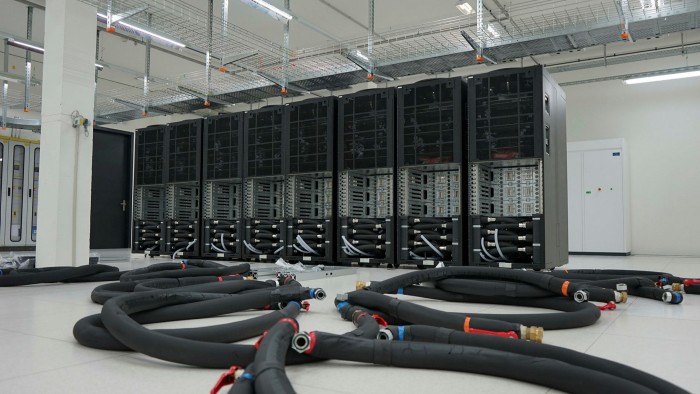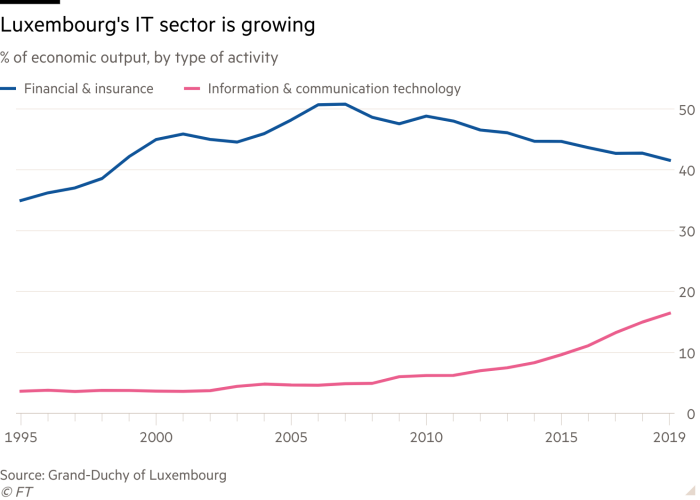Luxembourg bets on supercomputers

Roula Khalaf, Editor of the FT, selects her favourite stories in this weekly newsletter.
Cyber attacks are unlikely ever to be eliminated, according to some experts.
“Prevention of security issues is a lost cause,” says Koen Maris, cybersecurity leader at management consultancy PwC Luxembourg. He says that, for organisations, it is better to detect and eliminate an attack as early as possible, instead of “putting all your money in the prevention basket”.
There certainly is money available. For a country with a population of less than a million people, nearly half of whom hold foreign nationality, the Luxembourg cybersecurity industry is booming. According to LuxInnovation, the national innovation agency, the Grand Duchy has 310 companies working in the field, 80 of which have cybersecurity as their core business. A third of start-ups have cybersecurity as their core.
By comparison, the UK, with a population more than 100 times larger, at 67m, had 1,200 cybersecurity companies at the end of 2019 — less than four times the number in Luxembourg.

“We see cybersecurity not only as a defence issue, but also as an economic success factor,” says economy minister Franz Fayot.
An organisation called Security Made in Lëtzebuerg, set up by the Ministry of the Economy, provides cybersecurity services free of charge. Its UK and French counterparts, the National Cyber Security Centre (NCSC) and the National Cybersecurity Agency (ANSSI), both stem from the French ministry of defence and the UK’s intelligence organisation GCHQ respectively.
“This subtle difference in focus means that the ecosystem [in Luxembourg] is more strongly geared towards business needs, rather than those of the military,” says Laurent de la Vaissière, partner at management consultancy KPMG.

The Luxembourg government is not just focused on protection, but also on supporting its financial industry and remaining an attractive business partner. Investment in expanding technological capacity and infrastructure continues, with projects including MeluXina, a €30m supercomputer that is expected to be completed in May. It is backed by the EU’s EuroHPC network, which has its headquarters in Luxembourg.
High-performance computing (HPC) means using supercomputers to process large and complex bodies of data. From 2020, the EU has proposed its initial €1bn budget for high-performance computing be raised to €8bn, in the hope that supercomputers can help find new coronavirus drugs, fight climate change and optimise manufacturing, among other things.
The EuroHPC network will include extremely fast petascale supercomputers in Portugal, Czechia, Slovenia and Bulgaria, and even faster pre-exascale supercomputers in Italy, Spain and Finland.
Luxembourg wants more than to be part of this system. It wants to sell it.

“Aside from politicians, nobody really cares about petaFLOPS [a measure of computing speed],” says Pascal Bouvry, explaining why it is not size that makes MeluXina special.
The professor at Luxembourg University is also CEO of LuxProvide, the company deploying and managing the supercomputer. MeluXina will have a “modular architecture”, allowing applications ranging from modelling and forecasting to big data and artificial intelligence, and through its adaptability hopefully useful in a large range of sectors.
MeluXina is funded jointly by the EU, which has contributed €10m, and the Luxembourg government, which has spent €20.4m. Once completed, 35 per cent of MeluXina's capacity will support other HPC projects in 33 different European countries (including the UK), and be used free of charge.

The remaining 65 per cent will be commercially available, “which is unique within the European supercomputer network,” Fayot says.
However, a 2018 report for the European Commission noted that one challenge may be HPC’s ability to make money from commercial contracts.
Luxembourg plans to use forward sales to provide sustainable long-term revenues. “We have a wide spectrum of customers with very different needs and we need to provide a machine with very different capabilities,” Bouvry says.
Luxembourg can bring stakeholders together quickly and easily owing to its small size. Because it is building its HPC system from scratch, it does not have the problem of different systems competing with one another.
A government-funded network of Tier IV data centres (the most reliable type of data centre), which house servers and storage facilities, was already in place.
“Over the past decade, major infrastructure investments have been made, notably in extensive broadband networks, international connectivity and state-of-the-art highly secured data centres,” Fayot says. In 2017, 40 per cent of Europe’s Tier IV data centres were in Luxembourg.
Luxembourg is aiming high with cybersecurity, and with good reason. “In the beginning of the internet, [attacks were] easy to prevent,” Maris says. “If you wanted to segregate yourself from the evils of the internet, you put up a firewall.
“Nowadays, we are outnumbered. The number of attacks and attackers are far higher than the number of people on the other side defending [against] and detecting the attacks.”
This story is part of a special report Luxembourg: Data and Innovation.

Comments